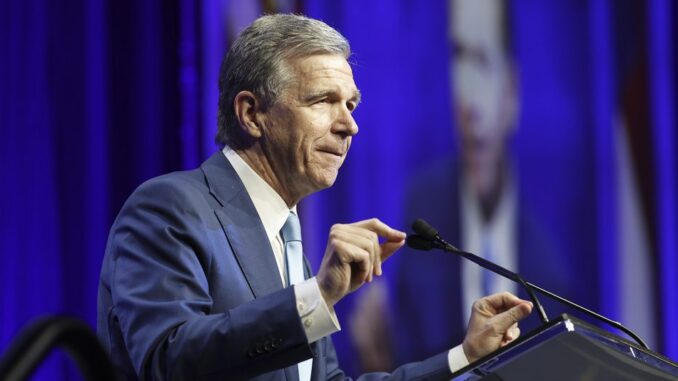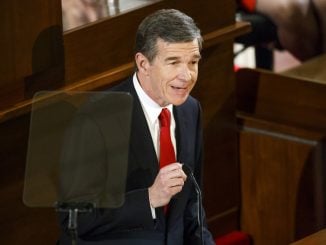
No one knows the importance of selecting the right running mate better than Vice President Kamala Harris. With Harris now the leading candidate to succeed President Joe Biden as the presumptive Democratic presidential nominee, a look at the top contenders to be on the ticket.
Andy Beshear
The Kentucky governor secured his reputation as a rising party star by beating Donald Trump-endorsed candidates in a Republican stronghold.
Beshear displayed a disciplined, tenacious style in winning reelection last year by defeating then-Attorney General Daniel Cameron. The governor has urged Democrats to follow his winning formula by focusing on the everyday concerns of Americans, from good-paying jobs to quality education and health care.
Beshear, 46, supports abortion rights, but in Kentucky, he has tailored his message to push back against what he calls an extreme ban that lacks exceptions for rape and incest victims.
He won widespread praise for his empathy and attention to detail in guiding the Bluegrass State through the COVID-19 pandemic and leading the response to tornadoes and flooding that caused massive damage. He honed his speaking skills by holding regular news conferences that often last an hour or so.
Beshear has presided over record economic growth in Kentucky, and he typically begins his briefings by promoting the state’s latest economic wins. He frequently mentions his Christian faith and how it guides his policymaking.
A lawyer by trade, Beshear won election as state attorney general in 2015. He then unseated Trump-backed Republican Gov. Matt Bevin in 2019.
Beshear entered politics with a strong pedigree as the son of two-term Gov. Steve Beshear, but he has faced tougher political obstacles. Andy Beshear, unlike his father, has dealt with an entirely GOP-controlled Legislature and Republican lawmakers have stymied some of his priorities. One of them is state-funded preschool for every Kentucky 4-year-old.
Roy Cooper
The North Carolina governor has won six statewide general elections over two decades in a state where Republicans routinely prevail in similar federal races and also control the legislature.
Cooper, 67, has received strong job-approval ratings as governor, benefiting from a booming state economy for which his administration and lawmakers take credit. He also portrays himself as a fighter for public education and abortion rights. While Cooper finally persuaded GOP legislators last year to expand Medicaid under the Affordable Care Act, other efforts have been thwarted by a General Assembly with veto-proof majorities that has eroded his formal powers.
A native of small-town Nash County, Cooper was a high school quarterback and head of the Young Democrats at the University of North Carolina, where he obtained both his undergraduate and law degrees. “Coop,” as he was known to friends, came home and worked at his father’s law firm.
Cooper upset the Democratic incumbent in a 1986 state House primary race and was elected to the General Assembly. He served 14 years there and later became the Senate majority leader.
Cooper was elected attorney general in 2000, a position he held for 16 years. In that post, he is likely best known nationally for declaring three former Duke University lacrosse players innocent after they were accused of sexual assault by an escort service dancer.
Cooper unseated another incumbent in 2016, beating Republican Gov. Pat McCrory by roughly 10,000 votes. A top campaign issue was the “bathroom bill” that McCrory signed requiring transgender people to use public restrooms that corresponded with the sex on their birth certificates. As governor, Cooper quickly reached an agreement with legislators to partially repeal the law.
His time as governor also was marked by restricting business and school activity during the COVID-19 pandemic. He won reelection in 2020 by 4.5 percentage points even as Trump won the state’s electoral votes.
Cooper and his wife, Kristin, have three grown daughters.
Mark Kelly
The Arizona senator leveraged his career as an astronaut to build a brand as a moderate in a state that long supported Republicans.
In his two campaigns — the first in 2020 to finish the term of the late Republican Sen. John McCain and the second two years later for a full term — Kelly has earned more votes than any other Democrat on the ballot. He outpolled Biden, who narrowly won Arizona, by 2 percentage points in 2020.
Kelly’s first turn in the national political spotlight came through tragedy. His wife, then-U.S. Rep. Gabrielle Giffords, was shot in the head while meeting with constituents outside a grocery store in Tucson. The shooting left six people dead and spawned an early reckoning with political violence and partisan rancor.
Giffords’ survival made her a national inspiration but snuffed out her promising political career. She and Kelly went on to found a gun-control advocacy group, and Giffords has been a powerful surrogate as Kelly has taken her place in politics.
In the Senate, Kelly has focused on national security and the military as well as the drought plaguing the U.S. West. He was instrumental in crafting the CHIPS and Science Act, a bill signed by Biden to boost U.S. semiconductor manufacturing.
Kelly was a Navy test pilot and flew 39 combat missions during the Gulf War before joining NASA, where he flew three missions on the space shuttle.
Originally from New Jersey, he settled with Giffords in Tucson after retiring from NASA and the Navy.
Unlike Arizona Sen. Kyrsten Sinema, who was elected as a Democrat two years before Kelly but later left the party to become an independent, Kelly has managed to retain the support of the party’s grassroots base without alienating independent voters.
Josh Shapiro
Shapiro is halfway through his second year as Pennsylvania’s governor after easily winning his last election by trouncing a far-right, Trump-endorsed candidate.
Shapiro, 51, has been a surrogate for Biden, backing the president in appearances on cable networks, and has years of experience making Trump the focus of his attacks, first as state attorney general and now as governor.
He has won three statewide races — two as attorney general, one as governor — with a tightly scripted, disciplined campaign style, offering voters something of a lower-key alternative to the state’s brash political star, Sen. John Fetterman.
As governor, Shapiro has begun to shed a buttoned-down public demeanor and become more confident and plain-spoken. In one recent MSNBC appearance, he said Trump should “quit whining” and stop “sh— talking America.”
Shapiro, who is Jewish, has aggressively confronted what he viewed as antisemitism cropping up from pro-Palestinian demonstrations and has professed solidarity with Israel in its drive to eliminate Hamas.
He is a staunch proponent of abortion rights in Pennsylvania and routinely promotes his victories in court against Trump, including beating back challenges to the 2020 election results.
He also has positioned himself as a moderate on energy issues in the nation’s No. 2 natural gas state and plays up the need for bipartisanship in the politically divided state government.



